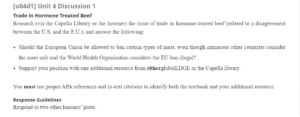Trade in Hormone Treated Beef
Many countries have implemented policies to protect consumers within their borders from harm. Some of these policies usually include restrictions on the trade of some products within the borders of the country. However, these policies do not always have to be uniform in all countries.
Should the European Union be allowed to ban certain types of meat, even though numerous other countries consider the meat safe and the World Health Organization considers the EU ban illegal?
The EU should be allowed to ban the importation of hormone-treated beef even though other countries and the World Health Organization have declared them safe. If the Union has any reason to believe that the meat is harmful, then it is their legal right to continue with the ban (Johnson & Hanrahan, 2010). This ban is not illegal in any way. International trade laws are not supposed to be uniform for all countries. A country develops trade laws that are believed to be beneficial to its consumers and businesses.
Regardless of the objections to the ban, the EU has the right to ban hormone-treated beef based on the precautionary principle. The precautionary principle is applied in a case of scientific uncertainty. The extent of the risk of hormone-treated beef is not known for certain. It is not illegal for the EU to use the small chance that this product may be harmful to implement policies to protect the people in its territories (Millstone & Lang, 2018). If there is a chance that the synthetic chemicals used in meat are harmful, a country has a legal right to protect its people. However, the actions of the EU will not legally force other countries to adhere to the same regulations.
References
Johnson, R., & Hanrahan, C. (2010). The US-EU Beef Hormone Dispute (pp. 7-5700). Washington, DC: Congressional Research Service.
Millstone, E., & Lang, T. (2018). Hormone-Treated Beef: Should Britain Accept It After Brexit?
ORDER A PLAGIARISM-FREE PAPER HERE
We’ll write everything from scratch
Question
[u04d1] Unit 4 Discussion 1
Trade in Hormone Treated Beef
Research (via the Capella Library or the Internet) the issue of trade in hormone-treated beef (related to a disagreement between the U.S. and the E.U.), and answer the following:

Trade in Hormone Treated Beef
- Should the European Union be allowed to ban certain types of meat, even though numerous other countries consider the meat safe and the World Health Organization considers the EU ban illegal?
- Support your position with one additional resource from either globalEDGE or the Capella library.
You must use proper APA references and in-text citations to identify both the textbook and your additional resource.
Response Guidelines
Respond to two other learners’ posts.
Resources
- . (Looking for DISTINGUISHED – set up your paper to hit each Topic)
UNDERGRADUATE DISCUSSION PARTICIPATION SCORING GUIDE
Due Date: End of weekly
Percentage of Course Grade: 30%.
| UNDERGRADUATE DISCUSSION PARTICIPATION GRADING RUBRIC | ||||
| Criteria | Non-performance | Basic | Proficient | Distinguished |
| Apply relevant course concepts, theories, or materials correctly. 33% |
Does not explain relevant course concepts, theories, or materials. | Explains relevant course concepts, theories, or materials. | Applies relevant course concepts, theories, or materials correctly. | Analyzes course concepts, theories, or materials correctly, using examples or supporting evidence. |
| Collaborate with fellow learners, relating the discussion to relevant course concepts. 33% |
Does not collaborate with fellow learners. | Collaborates with fellow learners without relating the discussion to the relevant course concepts. | Collaborates with fellow learners, relating the discussion to relevant course concepts. | Collaborates with fellow learners, relating the discussion to relevant course concepts and extending the dialogue. |
| Apply relevant professional, personal, or other real-world experiences. 34% |
Does not contribute professional, personal, or other real-world experiences. | Contributes professional, personal, or other real-world experiences, but contributions lack relevance. | Applies relevant professional, personal, or other real-world experiences. | Applies relevant professional, personal, or other real-world experiences to extend the dialogue. |
Participation Guidelines
Actively participate in discussions. To do this you should create a substantive post for each of the discussion topics. Each post should demonstrate your achievement of the participation criteria. In addition, you should respond to the posts of at least two of your fellow learners for each discussion question—unless the discussion instructions state otherwise. These responses to other learners should be substantive posts that contribute to the conversation by asking questions, respectfully debating positions, and presenting supporting information relevant to the topic. Also, respond to any follow-up questions the instructor directs to you in the discussion area.
To allow other learners time to respond, you are encouraged to post your initial responses in the discussion area by midweek. Comments to other learners’ posts are due by Sunday at 11:59 p.m. (Central time zone).

